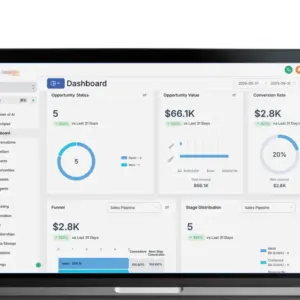Benefits of CRM for Small Businesses in New Zealand

Filters
Results
It’s no real secret that in a digital-first world, small businesses in New Zealand face many unique challenges. They must attract new customers, manage relationships, and increase sales. While a well-optimised website is vital, it’s not enough on its own.
That’s where CRM systems come in. These powerful tools can transform how small businesses operate. A CRM system centralises customer data, streamlines operations, and improves interactions. For any business looking to grow, CRM software is a game-changer.
CRM isn’t just about storing contact details. It’s about building long-lasting customer relationships and driving real business growth. With the right CRM platform, small businesses can boost service levels and customer satisfaction—leading to stronger loyalty and retention.
What Is a CRM System and Why Is It Important for Small Businesses?
CRM stands for Customer Relationship Management. It’s both a strategy and a software solution. At its core, a CRM helps manage and track interactions with leads and customers—critical for small businesses aiming to expand.
Here’s why CRM matters:
- It stores customer information in one central location.
- It helps improve service with faster, more accurate responses.
- It supports data-driven decision-making for sales and marketing.
For time-strapped small business owners, a CRM simplifies customer management. Everything is organised, searchable, and accessible in real time. That means fewer admin headaches and more time to focus on growth.
Core Benefits of CRM for Small Businesses
The strength of CRM systems lies in their flexibility and impact. They offer benefits far beyond contact management:
1. Improved Customer Service
A CRM ensures every team member has access to important customer information, from previous interactions to buying behaviour. This makes it easier to offer a personalised and responsive service experience.
2. More Efficient Sales Processes
CRM software automates many repetitive sales tasks and maximises efficiency with marketing automation. This allows sales and marketing teams to focus on converting leads. With a clear view of the sales pipeline, they can follow up faster and close more deals.
3. Smarter Marketing Campaigns
CRMs allow you to segment your audience and target campaigns with precision. By personalising your approach, your chances of converting leads into loyal customers increase dramatically.
4. Enhanced Team Collaboration
When everyone has access to the same customer data, collaboration improves. Sales, marketing, and service teams can align their strategies, resulting in better customer outcomes.
5. Time and Cost Savings
With automated workflows, manual tasks are reduced. That saves time, lowers costs, and reduces human error.
6. Scalability for Growth
As your business grows, your CRM can grow with you. Choose a system that’s flexible enough to meet your current needs—and scale as you expand.
How CRM Software Drives Sales and Lead Generation
A strong CRM strategy helps generate, track, and convert leads. It acts as a central hub for sales activities, ensuring no opportunity is missed.
Key benefits include:
- Lead prioritisation: Focus on leads most likely to convert.
- Automated follow-ups: Keep leads warm with scheduled reminders.
- Pipeline visibility: Spot where prospects drop off and refine your process.
- Sales personalisation: Customise your pitch using detailed customer history.
By aligning sales and marketing data, your team can run cohesive campaigns that drive consistent engagement. This boosts both conversion rates and customer satisfaction.
Strengthening Customer Relationships and Retention
Customer retention is cheaper than acquisition—and often more profitable. CRM systems support long-term relationship building by tracking each customer’s journey.
CRM tools enable:
- Personalised communication: Use preferences and history to customise messaging.
- Proactive engagement: Set alerts for contract renewals or special offers.
- Segmentation: Group customers based on behaviour for tailored campaigns.
These personalised experiences build trust, reduce churn, and increase repeat business.
Streamlining Operations and Increasing Team Productivity
CRM systems remove silos and inefficiencies in day-to-day operations. Instead of juggling spreadsheets and emails, your team gets one unified platform to manage tasks and customers.
Productivity benefits include:
- Centralised contact data and notes
- Automated admin processes
- Task assignment and collaboration features
The result? A more aligned and productive team that can deliver better results faster.
Using CRM Data to Make Informed Decisions
One of the biggest advantages of CRM systems is the ability to track, measure, and optimise. Analytics dashboards reveal what’s working—and what’s not.
CRM reports help with:
- Sales forecasting and trend tracking
- Customer behaviour analysis
- Campaign performance reviews
These insights let you make data-backed decisions that support long-term growth.
Integrating CRM with Your Website and Digital Tools
To get the most out of a CRM, it should integrate with your website, email marketing software, and eCommerce platform (if relevant).
Benefits of CRM integration include:
- Seamless data syncing across platforms
- Accurate tracking of form submissions, purchases, and behaviour
- Smarter personalisation through unified insights
This connected system improves user experience and helps convert more visitors into customers.
Choosing the Right CRM for Your Small Business
Believe me when I say, not all CRM platforms are equal. Trust me, we’ve tried them all… Consider your needs, goals, and team capabilities when choosing a system.
Use this checklist:
- Is it scalable as you grow?
- Does it integrate with your current tools?
- Is it user-friendly and intuitive?
- Does the price match the features you need?
Trial different options before committing, and gather feedback from your team. Adoption is key—so choose a CRM that people will actually use.
Overcoming CRM Implementation Challenges
Some businesses hesitate to implement a CRM due to perceived complexity. But with the right planning, setup is straightforward.
Tips for a smooth rollout:
- Get buy-in from your team early
- Clean and import data in stages
- Provide training and support
- Start simple and scale features over time
Addressing concerns upfront helps ensure your CRM becomes a daily driver of value, not another piece of unused software.
Action Plan: Getting Started with CRM
Ready to implement CRM? Follow these steps:
- Define your goals (sales growth, service improvement, etc.)
- Choose a system that fits your needs and budget
- Train your team and start with core features
- Review and optimise usage over time
Final Thoughts: Why Every Small Business Needs a CRM
CRM systems aren’t just tech tools—they’re growth engines. They help businesses build stronger relationships, work smarter, and grow faster.
For small businesses in New Zealand, a CRM can unlock new levels of efficiency and customer satisfaction. Embrace CRM today and give your business the foundation it needs to thrive tomorro




